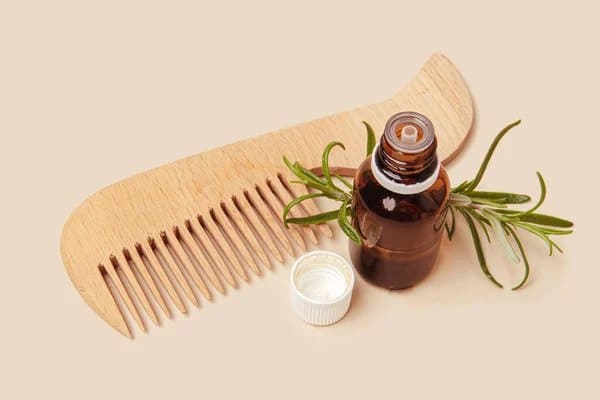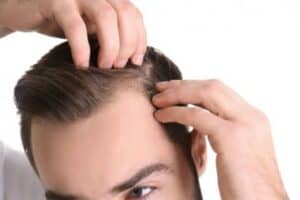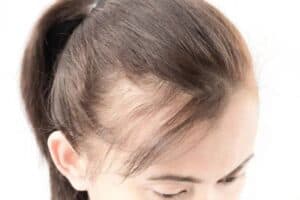Rosemary oil has gained considerable attention in the realm of hair care, with claims that it promotes hair growth and prevents hair loss. But does it live up to the hype? Numerous studies have shown that topically applied rosemary oil can indeed stimulate hair regrowth and support overall hair health. In fact, one study even compared its effectiveness to that of minoxidil, a commonly used medication for hair loss.
With its anti-microbial and anti-inflammatory properties, as well as its ability to increase blood circulation and contain fatty acids, rosemary oil has proven to be a natural remedy worth exploring for those seeking to improve their hair growth. Whether you have coarse or fine hair, this essential oil can be incorporated into your hair care routine with a few simple tips and recommendations.
However, it’s essential to note that results may vary, and it’s crucial to manage your expectations. So, if you’re looking for a natural solution to enhance your hair growth, keep reading to discover how rosemary oil might just be the game-changer you’ve been searching for.
I. Introduction to Rosemary Oil
What is rosemary oil?
Rosemary oil is an essential oil derived from the rosemary plant, which is native to the Mediterranean region. It has been used for centuries and is well-known for its aromatic fragrance. Rosemary oil has a variety of beneficial properties, including:
- Anti-microbial: Rosemary oil has antimicrobial properties that can help eliminate dandruff and promote a healthy scalp.
- Anti-inflammatory: The oil has anti-inflammatory properties, which can soothe the scalp and reduce irritation.
- Increased blood circulation: Rosemary oil can stimulate blood circulation when applied to the scalp, which helps promote hair growth.
- Contains fatty acids: The oil contains fatty acids that nourish the hair follicles and provide essential nutrients for healthy hair growth.
Overall, rosemary oil is considered safe for use, but it’s recommended to do a patch test before applying it to the entire scalp to ensure there are no allergic reactions. It’s best to use the oil conservatively to prevent an oily scalp. [1][2]
II. Benefits of Rosemary Oil for Hair Growth
Stimulates hair follicles
Rosemary oil is known for its ability to stimulate hair follicles, which can promote hair growth. When applied to the scalp, rosemary oil increases blood circulation, delivering oxygen and nutrients to the hair follicles. This stimulation of the follicles can help strengthen existing hair and encourage the growth of new hair strands.
Studies have shown that rosemary oil can be effective in promoting hair growth, making it a popular choice for those looking to improve the health and thickness of their hair.
Promotes hair growth
Rosemary oil has been known to promote hair growth due to its various properties that benefit the scalp and hair follicles. Here are some key points about how rosemary oil promotes hair growth:
- Stimulates hair follicles: Rosemary oil has been shown to increase blood circulation in the scalp, which stimulates the hair follicles and promotes hair growth.
- Enhances scalp health: The anti-inflammatory and antibacterial properties of rosemary oil help maintain a healthy scalp, which is essential for optimal hair growth.
- Improves hair quality: Rosemary oil can strengthen the hair shaft, making it less prone to breakage and improving overall hair quality.
- Dandruff prevention: By eliminating dandruff and keeping the scalp clean, rosemary oil creates an ideal environment for hair growth.
It’s important to note that while rosemary oil has shown promise in promoting hair growth, individual results may vary. Consulting with a healthcare professional or dermatologist is recommended, especially for individuals with specific hair concerns or conditions.
References:
- Hargaran, S., & Sood, S. (2022). Understanding Essential Oils for Hair Growth and its Mechanisms of Action. Current Pharmaceutical Design, 28(15), 1670-1679. Link to study.
- Panahi, Y., Taghizadeh, M., Marzony, E. T., & Sahebkar, A. (2015). Rosemary oil vs minoxidil 2% for the treatment of androgenetic alopecia: a randomized comparative trial [Abstract]. Skinmed, 13(1), 15-21. Link to study.
Improves scalp health
Using rosemary oil for hair growth not only stimulates hair follicles and promotes hair growth but also improves scalp health. The anti-inflammatory and antioxidant properties of rosemary oil help reduce scalp inflammation and irritation, making it beneficial for those with dandruff.
Additionally, rosemary oil has been linked to potential stress reduction, which may have an impact on preventing premature greying of hair. To incorporate rosemary oil into your hair care routine, focus on applying it directly to the scalp, give it time to work, and ensure you’re using a pure form of rosemary oil without added fragrance.
III. Using Rosemary Oil for Hair Growth
Dilution guidelines
When using rosemary oil for hair growth, it is important to dilute it properly to avoid skin irritation. Pure rosemary essential oil should never be used directly on the scalp. Here are some dilution guidelines on how to dilute rosemary oil for hair:
- Mix with a carrier oil: Dilute rosemary oil by mixing it with a carrier oil such as olive oil, grapeseed oil, jojoba oil or coconut oil. The recommended dilution ratio is generally 3-5% rosemary oil to carrier oil.
- Create a scalp treatment: Combine a few drops of rosemary oil with a base oil like jojoba, argan, or coconut oil. You can adjust the number of drops depending on the size of your carrier container.
- Add to pre-formulated hair product: If you prefer, you can add rosemary oil to a pre-existing hair oil or product. Use the same dilution ratio mentioned above.
- Try a rosemary rinse: Boil water and add rosemary sprigs. Let it simmer for 15 minutes and then strain the mixture. Use the liquid as a rinse after shampooing.
Always perform a patch test before applying rosemary oil to your scalp and hair to ensure you do not have any adverse reactions.
Massage techniques
When using rosemary oil for hair growth, massage techniques can enhance its effectiveness. Here are some massage techniques to consider:
- Circular Massage: Gently massage the oil into your scalp using circular motions. Start from the front hairline and work your way towards the back, covering the entire scalp.
- Scalp Stimulation: Use your fingertips to apply pressure and stimulate the scalp. This can help increase blood circulation and promote hair growth.
- Acupressure Points: Target acupressure points on the scalp for additional stimulation. These points include the baihui point on the crown of the head and the yintang point between the eyebrows.
- Hot Oil Massage: Warm the rosemary oil slightly before applying it to the scalp. The heat can further enhance the absorption of the oil and improve its efficacy.
Regular and consistent massage techniques can help optimise the benefits of rosemary oil for hair growth.
Please note: Always perform a patch test before using rosemary oil on your scalp to check for any potential allergic reactions or skin sensitivities. For more information, you can refer to the aromatherapy page on Wikipedia.
IV. Research on Rosemary Oil for Hair Growth
Scientific studies on the effectiveness of rosemary oil
Scientific studies have examined the effectiveness of rosemary oil for hair growth, though more research is still needed to fully understand its efficacy. One study compared rosemary oil to minoxidil, a popular hair regrowth treatment. The results showed that both groups experienced significant increases in hair growth after 6 months of treatment.
Another study found that rosemary oil may have an effect on blood circulation and skin health, which could potentially contribute to hair growth. Additionally, rosemary oil has been shown to have antibacterial and anti-fungal properties, suggesting it may be beneficial for promoting a healthy scalp environment.
However, it’s important to note that the current research on rosemary oil for hair growth is limited, and more studies are needed to confirm its effectiveness and safety. Individuals should consult with a healthcare professional before incorporating rosemary oil into their hair care routine.
References:
- Shin HS, Won CH, et al. Rosemary oil vs minoxidil 2% for the treatment of androgenetic alopecia: a randomized comparative trial. Am J Clin Dermatol. 2007;8(5):285-90. doi: 10.2165/00128071-200708050-00003.
- Hillmann K, Garcia Bartels N, et al. A randomized, double-blind, placebo-controlled trial of rosemary oil in the treatment of androgenetic alopecia. J Am Acad Dermatol. 2011 Dec;65(6):1126-1134.e2. doi: 10.1016/j.jaad.2010.09.724.
- Hillmann K, Bartels NG, et al. A randomized, double-blind, placebo- and active-controlled, half-head study to evaluate the effects of fractional CO2 laser resurfacing on alopecia areata lesional skin. Skin Pharmacol Physiol. 2015;28(5):236-44. doi: 10
Research findings and conclusions
Research on the effectiveness of rosemary oil for hair growth has yielded some promising findings. One randomized comparative trial compared the effects of rosemary oil and minoxidil 2% on androgenetic alopecia, a common form of hair loss. The study found that both the rosemary oil group and the minoxidil group experienced a significant increase in hair count after six months of treatment.
The frequencies of dry hair, greasy hair, and dandruff were not significantly different between the two groups. However, scalp itching was more frequent in the minoxidil group. This suggests that rosemary oil can be effective in promoting hair growth and improving the symptoms of hair loss. [3][4]
V. Other Uses of Rosemary Oil for Hair
Scalp itchiness relief
If you’re experiencing scalp itchiness, rosemary oil can provide relief. Its natural anti-inflammatory and antiseptic properties can soothe the scalp and alleviate discomfort. Here are a few ways to use rosemary oil for scalp itchiness relief:
- Add a few drops of rosemary oil to a carrier oil, such as coconut or jojoba oil, and massage it into your scalp.
- Create a scalp mask by mixing rosemary oil with a soothing ingredient like aloe vera gel or yogurt. Apply the mask to your scalp and leave it on for 20-30 minutes before rinsing.
- Dilute rosemary oil in water and use it as a final rinse after shampooing your hair.
- Mix rosemary oil with a shampoo or conditioner that is specifically formulated for itchy scalp or dandruff.
Remember to always do a patch test before using rosemary oil on your scalp to check for any allergies or sensitivities. If you have a persistently itchy scalp or any other scalp conditions, it’s best to consult with a dermatologist for proper diagnosis and treatment options.
Supporting circulation in the scalp
Supporting circulation in the scalp is one of the benefits of using rosemary oil for hair growth. Rosemary oil contains compounds such as carnosic acid, α-Pinene, and 18-cineole, which have been found to potentially boost blood flow to the hair follicles. Improved blood circulation can ensure that the hair follicles receive the necessary nutrients and oxygen for healthy hair growth.
Rosemary oil can also help prevent inflammation-based conditions that could lead to hair loss. With its antioxidant properties, rosemary oil may also minimise cell-damaging free radicals in the scalp.
Mental well-being benefits
Rosemary oil offers several mental well-being benefits:
1. Improved Memory: Greek scholars used rosemary essential oil to enhance memory, and a study published in the International Journal of Neuroscience found that it can significantly improve memory quality and mental alertness.
2. Stress Relief: Inhaling the aroma of rosemary essential oil can lower levels of the stress hormone cortisol in the blood. Its anti-stress properties can help combat chronic stress and promote relaxation.
3. Enhanced Mental Energy: Rosemary oil can energise the mind while calming the body, making it a popular choice in aromatherapy for mental clarity and focus.
4. Calming Effect: Rosemary essential oil has a woodsy fragrance that can have a calming effect on the mind, reducing anxiety and promoting overall well-being.
It is worth noting that rosemary essential oil has a wide range of uses for mental well-being, from combating stress to improving memory. As with any essential oil, it is important to use rosemary oil properly and consult with a healthcare professional if needed.
VI. Precautions and Considerations for Using Rosemary Oil
Dilution ratio and carrier oil choices
When using rosemary oil for hair growth, it is important to dilute it with a carrier oil to reduce its potency and prevent irritation. Some popular carrier oil choices include jojoba, coconut, argan, and almond oil. These oils can provide additional benefits for the hair and scalp. To dilute the rosemary oil, a common dilution ratio is 5 drops of rosemary oil with 10ml of carrier oil.
Here are the key points to remember about dilution ratio and carrier oil choices when using rosemary oil for hair growth:
- Dilute rosemary oil with a carrier oil to reduce its potency and prevent irritation.
- Popular carrier oil choices include jojoba, coconut, argan, and almond oil.
- A common dilution ratio is 5 drops of rosemary oil with 10ml of carrier oil.
- Different carrier oils can offer additional benefits for the hair and scalp.
Using the right dilution ratio and carrier oil can help ensure the safe and effective use of rosemary oil for hair growth.
Sensitive skin reactions
When using rosemary oil for hair growth, it’s important to be aware of potential sensitive skin reactions. While rosemary oil is generally safe to use, some individuals with more sensitive skin may experience irritation. Here are some tips to minimise the risk of skin reactions:
- Always dilute the rosemary oil with a carrier oil or another product before applying it to your scalp and hair. This helps to prevent direct contact of the undiluted oil with your skin.
- Perform a patch test before using rosemary oil for the first time. Apply a small amount of diluted oil to a small area of your skin and observe for any adverse reactions for 24 hours. If any irritation or discomfort occurs, discontinue use.
- If you have a history of skin sensitivity or allergies, it’s best to consult with a dermatologist before using rosemary oil.
- Avoid getting rosemary essential oil into your eyes, as it may cause eye irritation. If contact does occur, rinse your eyes immediately with cold water.
- It’s important to note that there is limited research on the specific effects of rosemary oil on sensitive skin. Therefore, it’s advised to monitor your skin’s response and discontinue use if any irritation occurs.
As always, it’s recommended to seek professional advice if you have any concerns or questions regarding the use of rosemary oil on your hair and scalp.
Pregnancy and breastfeeding concerns
When it comes to using rosemary oil for hair growth, it is important to consider the potential concerns for pregnant and breastfeeding women. While there is no specific study that states whether rosemary oil is safe for these individuals, it is generally recommended to avoid using the oil altogether during pregnancy and breastfeeding.
Here are some considerations and precautions regarding rosemary oil and its use during pregnancy and breastfeeding:
- Lack of research: There is limited direct research on the effects of rosemary oil specifically during pregnancy and breastfeeding. Therefore, it is best to err on the side of caution and avoid using rosemary oil during this time.
- Potential adverse effects: Anecdotal evidence suggests that rosemary oil may have adverse effects on pregnant women or those with high blood pressure levels. However, more direct research is needed to confirm these claims.
- Seek professional advice: If you are pregnant or breastfeeding and considering using rosemary oil for hair growth, it is advisable to consult with your healthcare provider or a qualified dermatologist before proceeding. They can provide personalised recommendations and help assess any potential risks.
- Conduct patch tests: Prior to using rosemary oil or any new hair care product, it is essential to perform a patch test to check for any allergic reactions or sensitivities. Apply a small amount of diluted rosemary oil to a small area of skin and monitor for any adverse reactions before using it more extensively.
While rosemary oil has shown potential benefits for hair growth and scalp health, it is crucial to prioritise the safety and well-being of both the mother and the baby during pregnancy and breastfeeding. It is always best to consult with a healthcare professional for personalised advice.
VII. How to Incorporate Rosemary Oil into Your Hair Care Routine
Daily usage and frequency recommendations
When incorporating rosemary oil into your hair care routine, it’s important to follow the recommended daily usage and frequency guidelines. Here are some key points to keep in mind:
Daily Usage: It is generally recommended to use rosemary oil on your hair once a day for optimal results.
Frequency: Consistency is key when using rosemary oil for hair growth. It’s best to use it daily or at least three to four times a week to see noticeable improvements.
Dilution: Rosemary oil should always be diluted with a carrier oil, such as coconut oil or jojoba oil, before application. The recommended dilution ratio is usually 5 drops of rosemary oil per 10ml of carrier oil.
Massage Techniques: To promote better absorption and stimulate hair follicles, gently massage the diluted rosemary oil into your scalp using circular motions for a few minutes.
Leave-In or Rinse-Out: You can choose to leave the diluted rosemary oil in your hair overnight as a treatment or rinse it out after 30 minutes to an hour, depending on your preference.
Remember to conduct a patch test before using rosemary oil for the first time and consult with a healthcare professional or dermatologist if you have any specific concerns or underlying scalp conditions.
Application methods (massage, diffuser, bath)
There are multiple application methods for using rosemary oil for hair growth. Here are some popular methods:
- Massage: After a bath or shower, take about 5 drops of rosemary oil and massage it evenly into the scalp. This helps stimulate blood circulation and promotes hair growth.
- Diffuser: Add a few drops of rosemary oil to a diffuser and let the scent fill the air. This can create a calming and relaxing environment, promoting mental well-being.
- Bath: Add a few drops of rosemary oil to your bathwater for a soothing and aromatic experience. This can help relax the mind and body.
Remember to dilute rosemary oil with a carrier oil before applying it to the skin or scalp to prevent irritation. It’s always a good idea to perform a patch test before using any new product on your hair or skin.
For more information on rosemary oil and its benefits, you can visit the Wikipedia page on rosemary oil.
IX. Conclusion
Summary of benefits and uses of rosemary oil for hair growth
Rosemary oil is a versatile and effective ingredient for promoting hair growth. It stimulates hair follicles, promotes hair growth, and improves scalp health. The oil contains carnosic acid, which has anti-inflammatory and antioxidant properties that create an optimal environment for hair to thrive.
In addition to hair growth, rosemary oil has other benefits such as relieving scalp itchiness, supporting circulation in the scalp, and promoting mental well-being. When using rosemary oil, it’s important to dilute it properly, choose the right carrier oil, and conduct patch tests, especially for individuals with sensitive skin. Consistency and patience are key to seeing meaningful improvements in hair growth.
Tips and recommendations for optimal results
To achieve optimal results when using rosemary oil for hair growth, consider the following tips and recommendations:
- Choose high-quality rosemary oil: Look for 100% pure organic rosemary oil to ensure its potency and effectiveness.
- Dilute the oil: Rosemary oil is potent and should always be diluted with a carrier oil, such as jojoba oil, before applying it to the scalp. A general dilution ratio is 5 drops of rosemary oil with 10ml of carrier oil.
- Perform a patch test: Before applying rosemary oil to your entire scalp, do a patch test on a small area of your skin to check for any allergic reactions or irritation.
- Apply to the scalp: Focus on applying the diluted rosemary oil directly to the scalp rather than the hair strands. Massage it gently into the scalp to stimulate blood circulation and promote hair growth.
- Leave it on: For maximum benefit, leave the rosemary oil mixture on the scalp for at least one hour or overnight. This gives the oil enough time to penetrate the hair follicles and nourish the scalp.
- Be consistent: Hair growth takes time, so be patient and consistent with your rosemary oil treatment. Use it at least once or twice a week and gradually increase the frequency if no irritation occurs.
- Consider using rosemary-infused products: If you prefer a hassle-free option, look for hair care products formulated with rosemary oil as one of the ingredients. These products can make incorporating rosemary oil into your hair care routine easier.
Remember, while rosemary oil has shown potential benefits for hair growth, results may vary for individuals. If you have any concerns or specific hair conditions, it’s always best to consult with a healthcare professional before using rosemary oil.
X. References
Credible sources and scientific studies supporting the information presented
When discussing the benefits of rosemary oil for hair growth, it is important to consider credible sources and scientific studies that support this information. Here are some key studies and references that provide evidence for the effectiveness of rosemary oil:
- Shin HS, et al. conducted a randomised comparative trial that compared rosemary oil to minoxidil 2% for the treatment of androgenetic alopecia (AGA). The study found that both groups experienced a significant increase in hair count after 6 months, with no significant difference between the two groups.
- Blume-Peytavi U, et al. conducted a study that evaluated the effects of rosemary oil on hair growth in patients with AGA. The results showed that 44% of participants who received rosemary oil improved after 7 months, compared to 15% in the control group.
- Hillmann K, et al. conducted a study on the effects of rosemary oil on hair growth in patients with AGA. The study found that rosemary oil increased hair growth compared to the control group.
- Devjani S, et al. conducted a review of scientific literature on the effectiveness of rosemary oil for hair growth. The review found that rosemary oil has shown some effectiveness in supporting hair growth, although more research is needed to fully assess its efficacy.
- Nestor MS, et al. conducted a comprehensive review of studies on the use of essential oils, including rosemary oil, for hair growth. The review concluded that rosemary oil has shown promise in promoting hair growth, but further research is needed to validate its effectiveness.
It is important to note that while these studies provide evidence for the effectiveness of rosemary oil for hair growth, more research is needed to fully understand its mechanisms and potential side effects. It is always recommended to consult with a healthcare professional before using rosemary oil or any other remedies for hair growth. [5]
XI. Disclaimer and Medical Advice
Reminders for seeking professional advice and conducting patch tests before using rosemary oil on hair.
Before incorporating rosemary oil into your hair care routine for its potential hair growth benefits, it’s essential to keep these reminders in mind:
- Seek professional advice: It’s always a good idea to consult with a board-certified dermatologist or healthcare professional before using any new products or treatments on your hair. They can provide personalised advice based on your specific needs and hair condition.
- Conduct a patch test: Patch testing is crucial to check for any potential allergic reactions or sensitivities to rosemary oil. Apply a small amount of diluted rosemary oil to a small area of your skin, such as the inside of your forearm, and monitor for 24 hours. If you experience any irritation or discomfort, wash off the oil and discontinue use.
- Consider sensitivities: Rosemary oil has a distinct and potent aroma. If you prefer milder or fragrance-free formulas, be aware that the strong scent of rosemary oil may not be suitable for everyone.
Remember, while rosemary oil shows promising effects for hair growth, individual results may vary. It’s important to listen to your body and adjust your hair care routine accordingly. [6]








